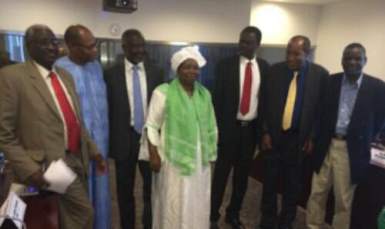African Union Commission chief meets Darfur rebels
March 7, 2014 (KHARTOUM) – The head of the African Union Commission, Nkosazana Dlamini-Zuma, received Friday a delegation of Darfur rebel groups to discuss ways to end the 11-year conflict including their demand for a comprehensive process to resolve Sudan’s armed conflicts.

The meeting also was attended by Al-Tom Hajo, deputy president of the rebel coalition Sudanese Revolutionary Front (SRF).
On the other hand, Dlamini-Zuma was flanked by the joint chief mediator for peace in Darfur Mohamed Ibn Chambas.
The South African diplomat who called for the meeting did not issue a statement about the encounter which is the first of its kind with Darfur rebel groups.
In a statement extended to Sudan Tribune following the meeting, the rebel delegation said they discussed SRF ideas for peace in Sudan abd they reiterated their commitment for a negotiated solution to end the conflicts in Darfur region and the Two Areas.
The SRF leaders pointed out that the “Government of the National Congress (Party) is not serious in its initiative (for national dialogue). Also, the delegation explained the need to unify the different peace processes,” said the statement.
The rebels further said that the “Revolutionary Front has its own initiative for peace which is more serious than the government’s initiative”.
The African Union supports the existing two separate tracks to end the armed conflicts in Darfur region and South Kordofan and Blue Nile states, but the rebel groups refuse separate negotiations with the Sudanese government.
However, they propose to establish one forum to discuss a comprehensive cessation of hostilities and humanitarian access to civilians in the rebel held areas in southern and western Sudan, following what a political process should be held with the participation of the other political forces.
The rebels further propose to form a national interim government. In addition, they propose to hold a national conference for constitutional reforms, following what general elections are organised and new government is formed.
The statement claimed that Dlamini-Zuma approved the rebel position and ensured them that the two peace mediators Ibn Chambas and Thabo Mbeki of the African Union High Level Implementation Panel (AUHIP) would work together to form one process.
Khartoum refuses the demand of rebel groups saying that they have to sign peace agreements based on the Doha Document for Peace in Darfur of 2011 and the Comprehensive Peace Agreement of 2005.
The Sudanese president however launched last January an initiative for national dialogue on constitutional reforms with the opposition parties to be held inside the countries and without the participation of regional or international mediators.
The statement said the chairperson of the AU commission expressed its readiness to receive all the SRF leadership in the near future.
The joint chief mediator held two meetings with JEM and SLM-MM in Arusha, Tanzania, and Addis Ababa to discuss ways to bring peace in Darfur. However, the two groups refused to resume talks with Khartoum.
Last February, AUHIP chief failed to persuade the SPLM-North to engage in direct negotiations with the government on the basis of a draft framework agreement he submitted to the two parties. The rebel groups which fight the government army in the Two Areas also demand a holistic process
Following what the former South African president said he would refer the matter to the AU Peace and Security Council “for further guidance”, stressing that it was impossible to bridge the gaps between the two parties.
(ST)
